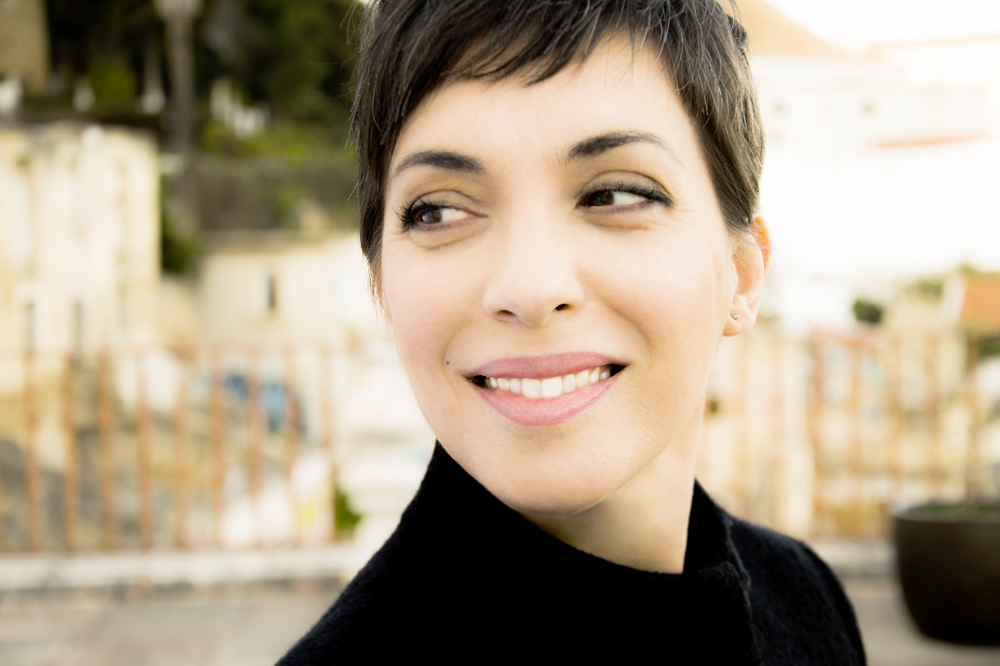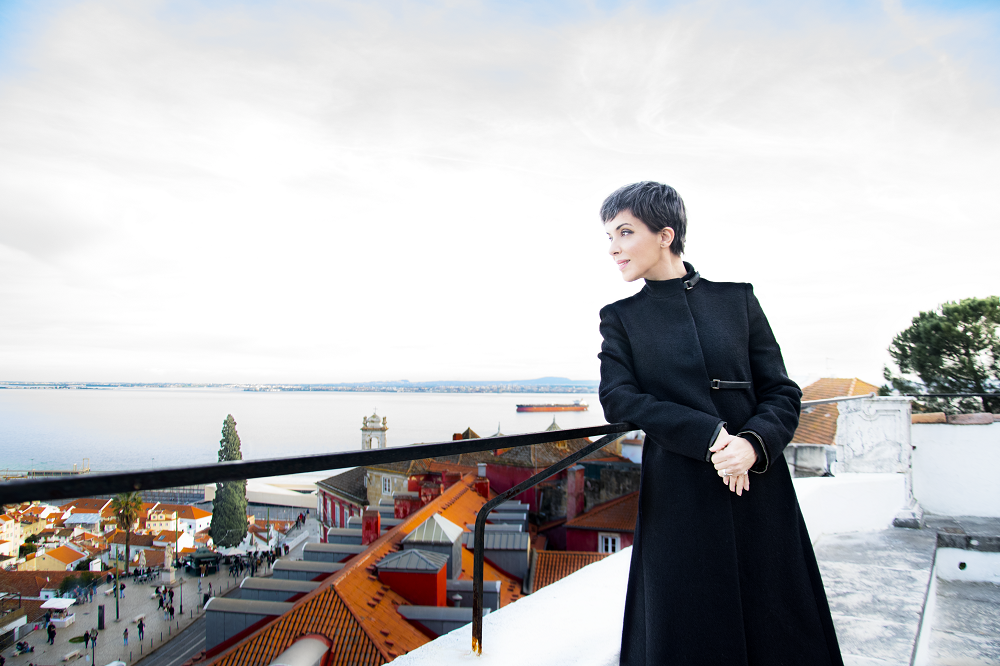entrevista
Teresa Salgueiro
"People still tell me it was with Lisbon Story that they discovered us."

Teresa Salgueiro was the face and voice of Madredeus for 20 years. She shared many albums, shows and trips with the band, but one of her most memorable experiences was the participation in Wim Wenders' film Lisbon Story. 25 years later, the singer reunites with the German director at the 13th edition of LEFFEST - Lisbon & Sintra Film Festival. On November 24, Teresa will bring to the stage of Teatro Tivoli BBVA a show dedicated to Wenders.
Is it true that you were discovered by chance while singing with some friends at a table next to Rodrigo Leão and Gabriel Gomes?
Back then I was 17 years old and Bairro Alto was a very mysterious place, very different from what it is today, with some small bars and clubs. My friends and I would go to all these places, and these night outings had a special charm because I was always singing – I had a friend who would always ask me to sing when we went out. This boosted my love for singing, as it gave me some feedback, the enthusiasm of the people who clapped and asked for more. On that particular day we were at Gingão, and Sétima Legião came in. They were looking for a singer, and I think I was the 14th singer they listened to. There is a very funny story related to that episode: Pedro Ayres was in Brazil and Rodrigo took the audition tape to the airport so he could hear it. Then they called me to work with them, and I never stopped since then.
You were only 17 when you joined Madredeus, which was an innovative project in the Portuguese music scene of the 1980s. Did you realize right away that the Madredeus sound was something unique and innovative?
The group was received, from the very first album, with a lot of enthusiasm by both the public and the critics. We recorded the first album in 1987, and at the end of the following year we were invited to the Bologna Young Artists Biennial. That’s when we realized that even people who did not understand the language actually loved our music. When this adventure began, I had no idea that music was going to be my life – although I wanted that. Music has always been a great company. As an only child, I spent most of my time listening to music and singing. I was fortunate to join a group that introduced me to a repertoire that was both familiar and completely new to me, and which ended up having a great impact on the public. The first few years were marked by a lot of enthusiasm, not least because we were entering a very different era from the one the country had experienced in the previous decade. Madredeus had a very Portuguese flavor, coming from tradition but renewing it. We had a different language, an intimate atmosphere, a quietness… I think we didn’t realize that right away, not like we do today when we look back and see what we did. I was singing songs that touched my heart, with which I could relate, and that sentimental aspect had a great impact on the public. My life slowly became the opposite of what I had experienced until then, as an only child who was studying and had never gone abroad. The first album was recorded in three nights at Teatro Ibérico. We had to play at night so as not to record the sound of the tram [laughs].
Did your parents encourage you?
I studied piano and when I started singing I was at Academia de Amadores de Música, but I wasn’t too serious about it. At home I would often create Song Festivals with my cousins, who lived downstairs. Singing was a constant presence and a company. When I started going out at night and singing during these outings, I was in love with two records my parents had at home, and which had a huge influence on me. One by Amália (the one with the bust on the cover and the song Abandono ), and Zeca Afonso’s Cantigas do Maio. Those were the songs I would sing when I went out at night.
You left the band in 2007. Did you feel it was time to pursue a solo career?
Our lives had changed, we had built our own families, so we had to manage our calendar differently. The first calendar lasted ten years; the second, another ten. But in the meantime, we stopped for a year to think about how to organize this. We had talked about having three or four months of very intense activity and then each one would do other things, not least because some band members had other projects. That year I recorded two albums produced by Pedro Ayres de Magalhães, and another album at the invitation of Polish composer Zbigniew Preisner – Silence Night & Dreams, recorded by EMI Classics. It was a very intense year in which I toured with these three projects. At the end of the year, when we discussed our calendar again, I got a very different proposal: a seven-year priority contract (not exclusive). It was either that or leaving the band. I was surprised by the inflexibility, but since things were like that, I decided to leave. For the first time, I said ‘no’.
But you never gave up on music…
In the meantime, I joined a repertory creation group and I started creating some melodies and writing some lyrics. With Madredeus I sang what they gave me. I had some room for creativity, but it’s not the same as having total freedom to create your own lyrics and melodies. This group did not go on, but I liked the idea of having a group of musicians with whom I would create a repertoire – which happened later, in 2011. I did a lot of things before that: I was in Italy, where I sang with the Solis String Quartet, while also creating concerts and writing arrangements, always looking for the right musicians to create that environment of great dedication. It finally happened in 2011, and in 2012 I recorded my first album, Mistério, and then the second one, Horizonte, in 2016. Between these two albums, I did another record in which I wrote the arrangements for several Mexican and Latin American songs.

You have worked with several internationally renowned artists such as José Carreras, Caetano Veloso and Gilberto Gil. Is there anyone you would like to work with?
I never thought about it. These collaborations have always been fleeting meetings, invitations I received. Only recently, in May, at a show I gave at Casino Estoril, did I invite two people to join me: Marisa Liz and Sara Tavares. Two women I admire deeply, with very different but equally charming personalities. Very strong and dedicated women I met Marisa when Amor Electro invited me to sing with them at Campo Pequeno, and I’d been following Sara’s career for many years, always with great interest. I’ve always liked her music. I invited the two of them, and I think it was wonderful.
Did you find it difficult to transition from being a singer to being a songwriter?
I was very happy when I found out I could do it. When we recorded the first album, we wanted to go to a place where we could focus entirely on our music, without any distractions. We stayed at Arrábida Convent (owned by Fundação Oriente, which generously lent us the space for a month). I had a lot of songs without any lyrics yet, but things flowed and went very well. Things were just waiting to come out. Somehow, I knew what I wanted to say. So the words came out and slowly fit into the metrics. The second album was more complicated, because it was more difficult to find the time to be fully available. I thought it would work the same way but I was completely wrong – things never repeat themselves. I tried to repeat the process but it didn’t work, not least because there were some distractions.
What gives you the most pleasure: singing other people’s lyrics or your own?
They are very different things. When I sing something, I relate to the words, even if they aren’t mine. I embody the character. It’s not like that with own lyrics. Although my lyrics are not autobiographical, they reflect my ideas, my philosophy of life. I feel more comfortable with my lyrics, I feel greater freedom. They are different but equally captivating.
You will always be associated with Madredeus. Do you see that as a burden or a source of pride?
I wouldn’t say it’s a burden, but sometimes it can be a bit limiting. People think of Madredeus as a distant band. Although we played a lot of concerts and sold out concert halls all over the world, it wasn’t the kind of music you’d hear on the radio, it wasn’t massive in that sense. People tend to downplay the influence Madredeus actually had. I can’t see it as a burden because it’s part of me, it’s what I am. It’s inseparable from me, it’s my musical DNA. It was 20 years. It’s a big part of my emotional structure. As time goes by, I can see things from a different perspective. So much so that it now makes sense to give a concert where I focus more on the group’s music.
25 years ago, you played a unique show for the premiere of Wim Wenders’ Lisbon Story . What memories do you have from that experience?
It was a beautiful coincidence. The label had just decided that our next record would be released in 32 countries. Back then [1994], Lisbon, which was the European Capital of Culture, commissioned a documentary about the city from Wim Wenders, and he asked us to use our music as the soundtrack. We hadn’t recorded anything for three years and we had a lot of new songs, so we suggested using an all-new repertoire. During a studio session, instead of recording one record, we recorded two. The music became the storyboard for the film and gave rise to a script that embodied Wim Wenders’ vision of Lisbon, so he eventually invited us to star in the film. It was a very enriching experience. For the band it was extraordinary because we ended up releasing our albums all over the world, and because we were part of a movie that opened up a new audience we might not otherwise reach. People still tell me it was with the movie that they discovered us.
What next?
I have written several things, loose things. I wrote a song based on a poem by José Saramago, called Alegria [Joy]. That joy marks the beginning of a new cycle.